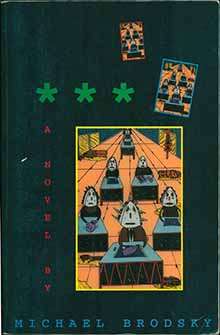*** (novel)
*** is Michael Brodsky's fifth novel. The title consists of precisely three asterisks, as mentioned on the book's copyright page as part of its Library of Congress cataloguing information.
 Cover of the 1st edition | |
| Author | Michael Brodsky |
|---|---|
| Cover artist | Mark Beyer |
| Country | United States |
| Language | English |
| Genre | Postmodern literature |
| Published | 1994 (Four Walls Eight Windows) |
| Media type | Print (clothbound hardcover, paperback) |
| Pages | 367 |
| ISBN | 978-1-56858-000-5 |
The book centers on Stu Potts, working for Dov Grey, captain of industry, creating ***s out of raws. No underlying meanings for "***", nor for "raw", both of which occur frequently in the text, are directly suggested.[1] Readers are left to struggle on their own. One reviewer[2] suggested "*** seem to be (depending on the passage and on the mood of the reader) archetypal widgets, phenotypes or, occasionally, art."
*** is also metafictional. The novel begins with a "PROLOGUE" title page. No other title page appears in the novel, as if the entire novel is prologue. Early on, a short chapter consisting of instructions on the assembly of the book's "thought packets" is provided, offering contradictory advice.[note 1][3] Towards the end, alternative plot lines are suggested and discarded, left for "the next time the story is told."[note 2]
How to pronounce ***
Before the novel was published, the strangeness of the title attracted attention. Brodsky was quoted in a brief note in The New York Times:
Ideally, you shouldn't say anything, but just visualize the asterisks. But I guess that saying 'Three Asterisks' is O.K.
— quoted in Sarah Lyall, NYT, "Book Notes", 11/3/1993, p C20
Plot summary
The novel opens with a 13-page section consisting almost entirely of paragraphs that begin "It all began with ...". These include some simple one-liners (including "bathroom smells, bathroom noises", "hunger, and thirst of course", "the loss of his credit cards") any one of which could start a typically written novel, but here do not. They also include longer paragraphs that refer all over the map, including some that look like they might have something to do with ***. For example, one paragraph starts by mentioning that Stu was very much liked by his fellow tenants (Mr. Bresson, Mr. Dostoevsky, Mr. Balzac, Mr. Xman). But being captioned very much liked was so terrible that Stu needed "a manly atmosphere, heady with *** work, to cure him of this pathos."[* 1] Another says that the beginning was when Stu felt he was one in an assembly line of listeners, each bound to repeat the story to the next listener.[* 2]
The story properly begins with Stu Potts attending a party hosted by Bette Kaye, noted for when "Dov Grey became Dov Grey."[* 3] Prominent among the attendees are Dov Grey and his wife Gwenda, employee Jomm Dawrson and his wife Tullshie (also called Miss Tullshie Dawrson née Dreadnought). Dov and Jomm share their hostility to the popular Hinkle-Winkle, who is "the eternal embodiment of goodish news,"[* 4] and a "freeloading ... world-class houseguest."[* 5] In contrast, their wives are sympathetic to Hinkle-Winkle and his associates, "a band of brotherly strugglers all, unhierarchizable sodality of free souls."[* 6] We learn later that Gwenda's sister Trendy is "wife and, depending on the time of day, concubine" to Hinkle-Winkle.[* 7]
Stu is hired by Dov, engaged in housecleaning. After six months,[* 8] Stu hates his job, and long philosophical conversations with Jomm do not help. Along the way, Stu takes a break walking outside, where he is confronted by the receptionist, Ms. Redmount.[* 9] He ignores her, and interprets street activity as incomplete transformation of raw into ***.
The next day, Dov dictates to Redmount, now his private secretary, while they make love, witnessed by Stu and Jomm over a glass partition.[* 10] Soon after, Stu listens in on Jomm and Dov discussing Gwenda, raws, and ***s.[* 11] Gwenda then has Stu in for his six-month review.
Reception
... a stunning redefinition of the novel, a postmodern extravaganza that has as much in common with a video game or a pinball machine as it does with Tolstoy or Dickens.
— John C. Hawley, San Francisco Chronicle, 7/10/1994
[***] centers on language, meaning, and the nature of the storytelling process itself. Those who share Brodsky's deconstructionist views will probably find this a challenging, innovative work. Those who don't will likely find it unreadable.
— Lawrence Rungren, Library Journal, 1994
... a novel filled with intellectual fireworks ...
— Judith Upjohn, "#$%!: review of ***",American Book Review, v16, no5, Dec-Feb 1994-5
"There is no story," Brodsky informs us early in this experimental anti-story, a deconstructionist meditation on capitalism and existentialism that has all the warmth, humor, and sophistication of an endless Stalinist tract. From its title of three asterisks one can tell that the master of the oblique is out to make life miserable for those who dare to try to make sense of his purposefully impenetrable novel.
— ?, Kirkus Reviews, 1994
Page references
- p. 16.
- p. 17.
- p. 22
- p.31.
- p. 38.
- p. 38.
- p. 57.
- p. 107.
- pp. 71,75.
- pp. 85–90
- pp. 91–102
Notes
- pp. 43–6.
- p 345.
References
- The book itself is a ***. Brodsky is aware of self-reference, using Gödel's name in the text at one point.
- in Publishers Weekly, 1994.
- The assemblage of "thought packets" is also part of Packet Piece